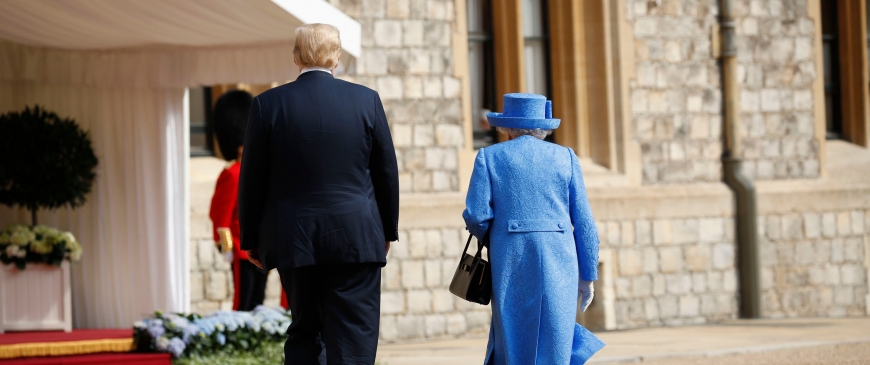
The special relationship may be awkward under Trump – but it is vital to Brexit Britain
President Donald Trump’s state visit to the UK from 3 to 5 June may show the relationship between the UK and US is more awkward than special these days. Strong ties with Washington are as important as ever for London, particularly as it pivots away from the European Union. But the pageantry of the visit and the commemoration of the 75th anniversary of the D-Day landings may not mask some fundamental differences of opinion - and the disdain many in the UK feel for the unpredictable US president.
A state visit to the UK by the leader of an ally should be a celebratory occasion, and a chance to show off the closeness of the bilateral relationship. It is also a signal honour: Queen Elizabeth II normally only hosts two inward state visits per year, and Trump will only be the third US president to enjoy the full royal reception, which includes a state banquet at Buckingham Palace.
Although the state visit is likely to show that bilateral ties are going through a rough patch, Trump’s engagements with the Royal family may be the one area that lives up to expectations. After meeting Her Majesty The Queen for tea during his 2018 Trump visit, the US president described the occasion as “something special.”
But several high profile figures have made clear they don’t think he deserves the full red carpet treatment. The visit is also expected to generate mass public protests. Trump will not make a speech to a joint session of parliament – something Barack Obama, Bill Clinton and Ronald Reagan all did – due in large part to the opposition of the Commons Speaker, John Bercow. Labour Party leader Jeremy Corbyn and Liberal Democrat leader Vince Cable are boycotting the state banquet in Trump’s honour.
When Theresa May extended the invitation to Trump on her visit to Washington on 27 January 2017, a week after his inauguration, she was taking a big risk. Trump is among the most polarising US presidents of modern times, and a controversial figure in the UK thanks to his brash and erratic behaviour, his opposition to climate change and immigration, as well as his links to arch-Brexiteer Nigel and other European right-wing populists.
The gamble has not paid off. When Trump paid a brief working visit to the UK in 2018, he attacked May’s Brexit deal in an interview before he arrived, saying it would “probably kill” a free trade agreement with the US. He also said Boris Johnson, a rival to May who is now favourite to be her successor, would make a “great prime minister.” That visit was marked by public protests, including a blimp depicting Trump as an orange baby in a nappy, complete with his distinctive golden quiff.
Trump’s state visit has been delayed for almost as long as possible; a visit in 2020, when Trump will presumably be concentrating on his re-election campaign, would have been very unlikely. Despite voting to leave the EU in 2016 - a decision endorsed by Trump - the UK is still stuck in Brexit limbo. It would show uncharacteristic reserve for the president to avoid commenting on the most divisive issue in UK politics for a generation – and whatever he says is likely to anger Leavers or the Remainers, or both.
Leavers would dearly love him to make a supportive statement about a post-Brexit US-UK free trade agreement. But with May due to resign as prime minister on 7 June, his comments may set the tone for trade talks, but will have little impact on the substance of any eventual deal the next prime minister might sign up to.
Traditionally, the UK would use a state visit by a US president to reinforce the important bilateral defence and security partnership which underpins the Special Relationship. The D-Day anniversary commemorations should provide a historical backdrop, but there are also modern tensions in this area. The most important disagreement is over whether to do business with Chinese telecoms giant Huawei. A controversial leak from the UK’s National Security Council, that led May to fire the defence secretary, suggested that the UK was willing to let Huawei supply equipment regarded as ‘non-core,’ such as antennae.
But the White House has taken a much tougher line about the security risks of working with Huawei and warned that it may not be able to share information with allies if they allow the Chinese company to work on their networks. The second issue is Trump’s apparent belief that British intelligence was involved in a plot against his election. The UK’s GCHQ spy agency has taken the unusual step of publicly dismissing the allegation as nonsense that should be ignored.
But despite all the irritants in the relationship, and all the risks of Trump saying something inflammatory, the British government must not lose sight of the continuing importance of the transatlantic partnership. The US is likely to remain the UK’s biggest trade and investment partner outside Europe, and it will continue to be vital to the UK’s defence and security. Trump’s presidency will not last forever, and the UK has a strong interest in ensuring that its relationship with the US outlives him.
Ian Bond is Director of Foreign Policy at the Centre for European Reform.
